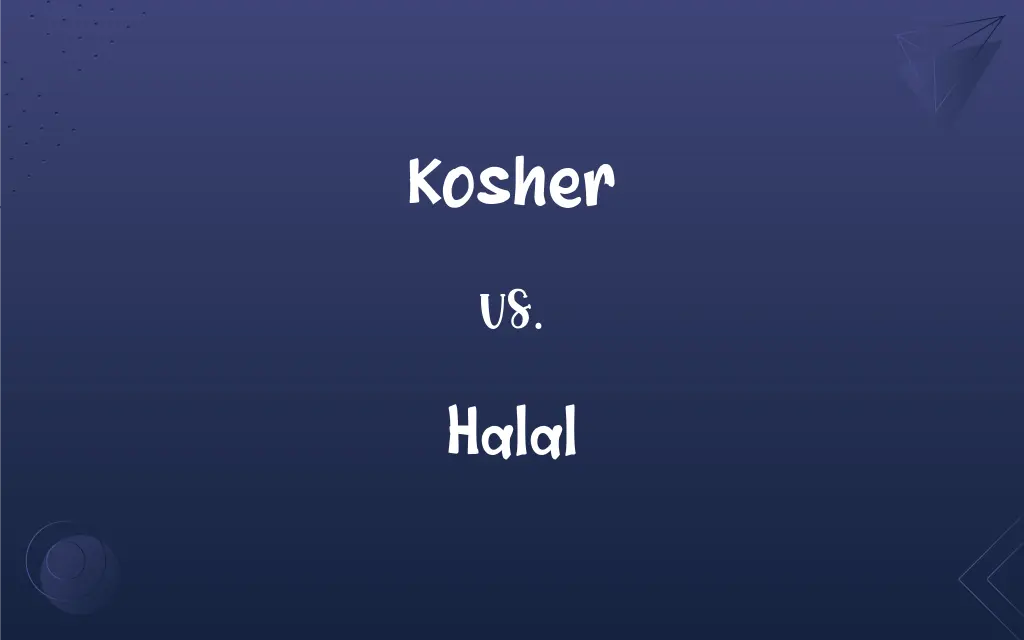Kosher vs. Halal: What's the Difference?
Edited by Janet White || By Harlon Moss || Updated on October 12, 2023
Kosher refers to foods permissible under Jewish dietary laws, while halal pertains to foods allowed under Islamic dietary laws.

Key Differences
Kosher delineates a set of dietary guidelines present in Judaism. The guidelines are detailed, specifying not only the types of foods that are permissible but also the way in which they must be prepared and eaten. For example, meat and dairy cannot be consumed together in a kosher diet.
Halal refers to what is permissible or lawful in traditional Islamic law. This term is often applied to dietary laws and specifically to permissible food and drinks. For example, pork is strictly prohibited in a halal diet, and animals must be slaughtered in a specific way to be considered halal.
Kosher dietary laws are outlined in the Jewish scripture and rabbinical texts. These laws are known for being quite detailed and stringent in terms of not only the kinds of foods allowed but also regarding their preparation, processing, and even packaging.
In contrast, halal dietary guidelines, while also strict, have some differences, particularly in the context of meat preparation. For meat to be considered halal, the name of Allah must be invoked at the time of the slaughtering, and it should be performed by a Muslim.
Kosher has several subcategories such as Pareve which signifies that the food is neither meat nor dairy, allowing it to be consumed with either group. It includes eggs, fish, and plant-derived foods, and requires dedicated utensils to maintain the classification.
ADVERTISEMENT
Halal, conversely, emphasizes more on the sanctity of life and humane treatment of animals during slaughtering. While it shares some similarities with kosher, such as the prohibition of consuming blood, it has distinct guidelines and principles that are derived from the Quran.
Comparison Chart
Origin
Jewish dietary laws
Islamic dietary laws
Meat and Dairy Consumption
Cannot be combined
Can be consumed together
Slaughtering
Can be performed by Jews
Must be performed by a Muslim
Blessing
No specific blessing required
Allah's name must be invoked
ADVERTISEMENT
Alcohol Consumption
Permitted
Generally prohibited
Kosher and Halal Definitions
Kosher
Ensuring the separation of meat and dairy in meals.
She made sure the restaurant had kosher options before booking.
Halal
Complying with Islamic dietary regulations.
The market specializes in halal products for the community.
Kosher
Adhering to Jewish dietary laws.
The family only buys kosher meat for their meals.
Halal
Ensuring lawful and permissible consumption under Islamic law.
Before traveling, he checked if there were halal restaurants nearby.
Kosher
Pertaining to specific preparation and slaughtering practices.
The butcher was trained in kosher slaughtering practices.
Halal
Excluding prohibited items such as pork and alcohol.
Halal dietary practices strictly prohibit the consumption of pork.
Kosher
Reflecting adherence to religious purity and cleanliness in dietary aspects.
Keeping a kitchen kosher requires diligence and knowledge.
Halal
Pertaining to ethical and humane slaughtering practices under Islamic guidelines.
The halal certification indicates adherence to ethical slaughtering.
Kosher
Observing religious guidelines even in food packaging and combinations.
The grocery store has a section dedicated to kosher foods.
Halal
Embracing a lawful and devout lifestyle, particularly in consumption.
In observance of their faith, they follow a halal dietary pattern.
Kosher
Conforming to dietary laws; ritually pure
Kosher meat.
Halal
Of or being meat from animals slaughtered in the manner prescribed by the shari'a
A halal butcher.
A halal label.
Kosher
Observing dietary laws
A kosher household.
Halal
In accordance with or permitted under the shari'a.
FAQs
What does "kosher" mean?
"Kosher" refers to food that adheres to Jewish dietary laws.
What is the key principle behind kosher food preparation?
Kosher food adheres to kashrut, Jewish dietary law, with specific slaughtering, preparation, and serving guidelines.
Is all kosher food also halal?
Not necessarily, as kosher and halal have different dietary guidelines and certifications.
What is not allowed in kosher diets?
Kosher diets prohibit consuming shellfish, pork, and mixing dairy with meat, among other restrictions.
Is the concept of halal present in other religious beliefs?
While halal is specific to Islam, analogous dietary practices might exist in other religions.
Does kosher certification apply to non-food products?
Yes, non-food items (like oven cleaner) can be kosher-certified to ensure adherence to dietary laws during cooking.
What is prohibited in halal diets?
Halal diets prohibit consuming pork, alcohol, and any meat not slaughtered in Allah’s name, among others.
What is kosher slaughtering called?
Kosher slaughtering is referred to as "shechita."
Can vegetarians eat kosher?
Yes, there are vegetarian foods that are kosher, but it’s essential to check for kosher certification.
Is there a concept of kosher in other religious practices?
While unique to Judaism, other religions might have similar dietary laws but not “kosher” per se.
Can kosher and halal lifestyles impact social and travel activities?
Yes, individuals adhering to kosher or halal may seek specific dining options when socializing or traveling.
Can one observe kosher or halal dietary practices flexibly?
Observance varies; some individuals strictly follow dietary laws, while others might practice with flexibility.
How is halal certification indicated on food products?
Halal food typically has a certification symbol or label (such as "Halal" in English or Arabic) on packaging.
What is halal slaughtering called?
Halal slaughtering is known as "dhabihah" or "zabiha."
Can vegetarians eat halal?
Yes, vegetarians can consume halal products, ensuring they don’t contain non-vegetarian ingredients.
Are there halal certifications for non-food items?
Yes, non-food items (like cosmetics) can be halal-certified to ensure they adhere to Islamic law.
What does "halal" mean?
"Halal" denotes food that complies with Islamic dietary laws.
Is all halal food also kosher?
No, while there are similarities, kosher dietary laws have distinct requirements not present in halal laws.
What is the key principle behind halal food preparation?
Halal food follows Islamic dietary laws, ensuring permissible slaughtering processes and avoiding prohibited items.
Can kosher be identified by a symbol?
Yes, kosher products often have a certification symbol (like "U" in a circle, "K", etc.) on packaging.
About Author
Written by
Harlon MossHarlon is a seasoned quality moderator and accomplished content writer for Difference Wiki. An alumnus of the prestigious University of California, he earned his degree in Computer Science. Leveraging his academic background, Harlon brings a meticulous and informed perspective to his work, ensuring content accuracy and excellence.
Edited by
Janet WhiteJanet White has been an esteemed writer and blogger for Difference Wiki. Holding a Master's degree in Science and Medical Journalism from the prestigious Boston University, she has consistently demonstrated her expertise and passion for her field. When she's not immersed in her work, Janet relishes her time exercising, delving into a good book, and cherishing moments with friends and family.































































